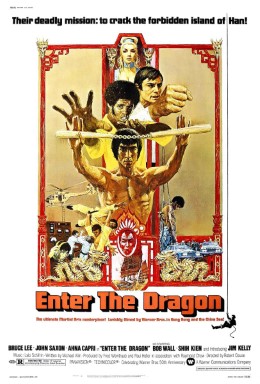
Enter the Dragon is a 1973 martial arts film directed by Robert Clouse and written by Michael Allin. The film, which stars Bruce Lee, John Saxon and Jim Kelly, was Lee's final completed film appearance before his death on 20 July 1973 at the age of 32. An American-Hong Kong co-production, the film was premiered in Los Angeles on 19 August 1973, one month after Lee's death.

Drunken Master, also known as Drunken Master The Beginning, is a 1978 Hong Kong martial arts comedy film directed by Yuen Woo-ping and produced and co-written by Ng See-yuen. The film features much of the same crew as Yuen's Snake in the Eagle's Shadow released earlier the same year, including lead actors Jackie Chan, Yuen Siu-tien, and Hwang Jang-lee; although narratively unrelated, Drunken Master bears similarities to its predecessor in its story and style.

Kung-Fu Master, known as Spartan X in Japan, is a side-scrolling beat 'em up developed by Irem as an arcade video game in 1984, and distributed by Data East in North America. Designed by Takashi Nishiyama, the game was based on Hong Kong martial arts films. It is a loose adaptation of the Jackie Chan, Sammo Hung, and Yuen Biao film Wheels on Meals (1984), called Spartan X in Japan, with the protagonist Thomas named after Jackie Chan's character in the film. The game is also heavily inspired by the Bruce Lee film Game of Death (1972), which was the basis for the game's concept. Nishiyama, who had previously designed the side-scrolling shooter Moon Patrol (1982), combined fighting elements with a shoot 'em up gameplay rhythm. Irem and Data East exported the game to the West without the Spartan X license.
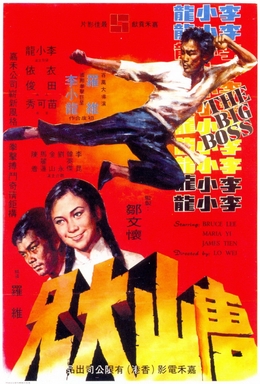
The Big Boss is a 1971 Hong Kong action martial arts film produced by Raymond Chow and starring Bruce Lee in his first major film in a lead role. The film also stars Maria Yi, James Tien, Tony Liu, and Nora Miao. Originally written for Tien, the leading role was given to Lee instead when the film's original director, Ng Kar-seung, was replaced by Lo. The film was a critical success and excelled at the box office. Lee's strong performance overshadowed Tien, already a star in Hong Kong, and made Bruce Lee famous in Asia and eventually the world.
The Game of Death is an incomplete Hong Kong martial arts film, of which portions were filmed between September and October 1972, directed, written, produced by and starring Bruce Lee. The project was paused to film and produce Enter the Dragon. For The Game of Death, over 120 minutes of footage was shot, which was later misplaced in the Golden Harvest archives. The remaining footage has since been released with Lee's original Cantonese and English dialogue, with John Little dubbing Lee's Hai Tien character as part of the documentary titled Bruce Lee: A Warrior's Journey. Much of the footage that was shot is from what was to be the climax of the film.

Fist of Fury, also known as The Chinese Connection, is a 1972 Hong Kong action martial arts film directed by Lo Wei and produced by Raymond Chow under Golden Harvest. The film stars Bruce Lee in his major role after The Big Boss (1971). Bruce Lee also worked as the film's action choreographer. In the film, Chen Zhen, a student of Huo Yuanjia, fights to defend the honor of the Chinese in the face of foreign aggression and also exact vengeance responsible for Huo's death.
Chopsocky is a colloquial term for martial arts films and kung fu films made primarily by Hong Kong action cinema between the late 1960s and early 1980s. The term was coined by the American motion picture trade magazine Variety following the explosion of films in the genre released in 1973 in the U.S. after the success of Five Fingers of Death. The word is a play on chop suey, combining "chop" and "sock".
Bruce Li is a Taiwanese martial artist and actor who starred in martial arts films from the Bruceploitation movement.
Bruceploitation is an exploitation film subgenre that emerged after the death of martial arts film star Bruce Lee in 1973, during which time filmmakers from Hong Kong, Taiwan and South Korea cast Bruce Lee look-alike actors ("Lee-alikes") to star in imitation martial arts films, in order to exploit Lee's sudden international popularity. Bruce Lee look-alike characters also commonly appear in other media, including anime, comic books, manga, and video games.
Hong Kong action cinema is the principal source of the Hong Kong film industry's global fame. Action films from Hong Kong have roots in Chinese and Hong Kong cultures including Chinese opera, storytelling and aesthetic traditions, which Hong Kong filmmakers combined with elements from Hollywood and Japanese cinema along with new action choreography and filmmaking techniques, to create a culturally distinctive form that went on to have wide transcultural appeal. In turn, Hollywood action films have been heavily influenced by Hong Kong genre conventions, from the 1970s onwards.

Fist of Legend is a 1994 Hong Kong martial arts film directed and co-written by Gordon Chan, featuring action choreography by Yuen Woo-ping, and produced by Jet Li, who also stars in the lead role of Chen Zhen. It is a remake of the 1972 Bruce Lee film Fist of Fury.
The Bloody Fists, is a 1972 Hong Kong action film directed by See-Yuen Ng and starring Chen Siu Sing and Kuan Tai Chen. The memorable fight scenes were choreographed by Yuen Woo-ping, better known for choreographing Crouching Tiger, Hidden Dragon and The Matrix.
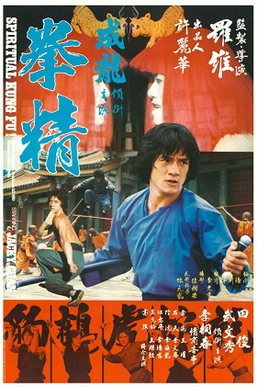
Spiritual Kung Fu is a 1978 Hong Kong action martial arts film directed and produced by Lo Wei, and starring Jackie Chan and James Tien. The film also features Yuen Biao as one of the Master of the Five Fists martial arts. Chan was also the film's stunt co-ordinator. It was also known in some other dubbed language releases as Karate Ghostbuster.
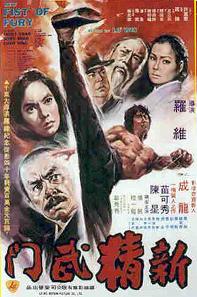
New Fist of Fury is a 1976 Hong Kong martial arts film directed by Lo Wei and starring Jackie Chan. It is the first of several films that Lo directed Chan in, and the first using Chan's stage name Sing Lung.
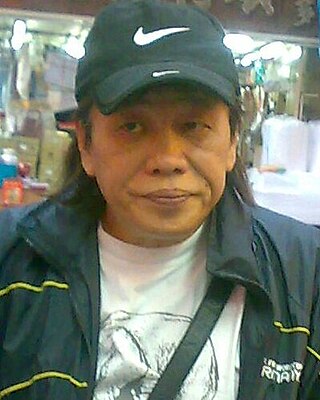
Bruce Liang is a Hong Kong martial artist and actor who has appeared in many Hong Kong martial arts movies. He often appeared billed as "Bruce Leung", "Bruce Liang", "Bruce Leong", or "Bruce Leung Siu-lung", and is thus generally grouped among the Bruce Lee clones that sprang up after Lee's death in the subgenre known as Bruceploitation.

Fist of Fury II is a 1977 Hong Kong kung fu film directed by Iksan Lahardi and Tso-nam Lee, and starring Bruce Li and Lo Lieh. It is the sequel to Bruce Lee’s 1972's Fist of Fury. The film also goes by the alternate titles Chinese Connection 2 and Fist of Fury Part II.
Fist of Fury III is a martial arts Bruceploitation sequel. It was originally released in Hong Kong as Jie quan yingzhua gong, and has been informally called Chinese Connection III. It continues the story of Chen Shen from Fist of Fury II, the brother of the Bruce Lee character in Fist of Fury.
Bruce Le is a martial artist and actor known for his martial arts film of the 1970s and 1980s. Most of these were inexpensively produced and were made to capitalise on the martial arts phenomenon started by Bruce Lee, whose death in 1973 left a large box office void.
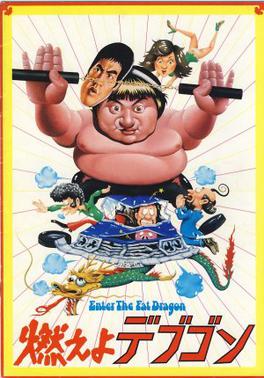
Enter the Fat Dragon is a 1978 Hong Kong martial arts film starring and directed by Sammo Hung. The film is mostly a parody of the Bruce Lee film Way of the Dragon (1972), and a satire of the Bruceploitation phenomenon of the 1970s. The title is a reference to another Bruce Lee film, Enter the Dragon (1973).

This article details the filmography of actor and martial artist Bruce Lee.










